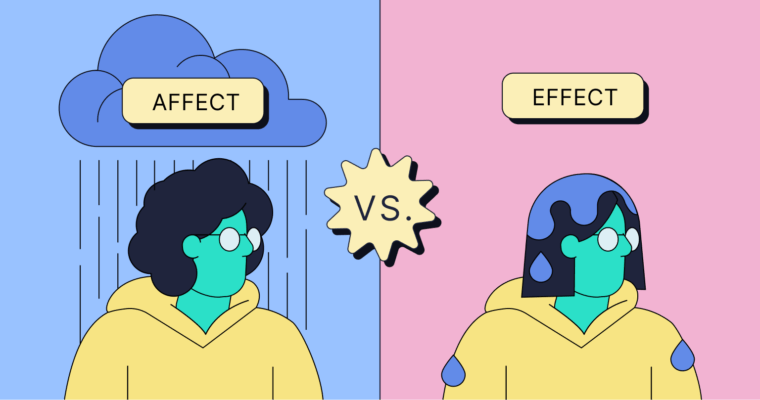
Affect and effect are easy to mix up. Here, we’ll explain where the confusion comes from and lay out all the various scenarios for using affect and effect, so you’ll always know when it’s time to be affecting and when it’s time to be effective.
Affect vs. effect
Affect is usually used as a verb meaning “to influence or produce a change in something.” Effect is generally used as a noun, and refers to the result of a change, but it’s sometimes used as a verb meaning “to bring about a specific change.”
Rain affects plants. The most powerful effect of rain is that plants grow faster.
In the majority of cases, you’ll encounter the verb affect and the noun effect in closely related scenarios having to do with actions and their consequences: If A affects B, B experiences the effect of A’s action.
In other words, imagine Ruby (A) pushes Raphael (B) into a pond. Ruby affects where Raphael is standing. Raphael getting wet is the effect of Ruby’s act.
Because Ruby performed an action, that signals the use of the verb: affect. The result, or effect, of that verb is wetness, a noun that is probably causing Raphael a whole lot of discomfort. Part of the reason that affect as a verb and effect as a noun are so easy to confuse is the fact that (at least in spoken American English) they sound almost identical. Some other examples of similar-sounding (and sometimes confusing) words that people tend to mix up are flaunt/flout, assure/ensure/insure, and advice/advise.
How to use affect
Here’s a tip: A is for action. Verbs are about action. Affect starts with an a, and it’s a verb.
The tornado affected citizens within forty miles of Topeka.
The medicine will affect your eyesight for at least an hour.
Winning the swimming medal affected Tina’s performance in school.
Examples of affect
Gravity affects everything in the universe, but the amount of gravity affecting an object depends on two things: the masses of the objects being attracted and the distance between the objects.—Study.com, “The Effects of Mass & Distance on Gravity”
It is only by understanding how language can affect culture that you can learn the best way to use language when communicating with a different culture. The influence of language is intertwined with its culture and provides a sense of stability and continuity among a group of people.—Love to Know, “How Does Language Affect Culture? Explaining the Connection”
And we could do nothing to help them; Dunham was crying quietly beside me, and all the men were affected by the piteous cries.—Edwin Campion Vaughan Some Desperate Glory: The Diary of a Young Officer, 1917
Note that in that last example, the men are affected because they are changed by the disturbing events of war, but that this change has an emotional factor too. When a person is affected by an event, that often means that the effect is on the level of emotion or psychology. More on that in the exceptions section.
What are synonyms for affect?
- alter
- change
- influence
- modify
- and impact (the verb version)
That list should affect your understanding of the word. In this case, affect would mean to improve.
How to use effect
Here’s a tip: Think of the common phrase cause and effect. Cause ends with an e, and effect begins with an e. So not only does a cause lead to an effect, but also cause’s e leads to effect’s e, giving you a handy way to remember which spelling to use.The effect of the tornado was devastating.
You’ll feel the effect of the medication in the next twenty minutes.
Tina’s big win had an effect on her overall confidence level.
Examples of effect
Humans can reduce the effects of climate change on the environment by signing international treaties to address climate change, pledging carbon neutrality, and switching to renewable energy, electric cars and plant-based diets.—StudySmarter, “Human Impact on Climate Change”
And the bell had the effect of releasing us all from the paralyzing tension we had just survived—but for only an instant.—John Irving, A Prayer for Owen Meany
And here’s a twofer, just for fun:
The most common side effects of antibiotics affect the digestive system.—NHS inform, “Antibiotics”
Synonyms of effect
- result
- repercussion
- consequence
- outcome
- aftermath
- impact (the noun version)
Exceptions to the general rule
Now that you’ve mastered the difference between affect and effect as they are most often used let’s go over the less common ways these words come up.
Effect as a verb
Effect as a verb means to directly bring about some result. It usually shows up with a noun like change or solutions as a direct object.
The protesters wanted to effect change in the corrupt government.
In other words, the protesters wanted to bring about the effect of change—maybe by getting the government to change its policies or step down. For the verb affect, the direct object is the thing being impacted or influenced. For the verb effect, the direct object is the thing being brought about—in this case, change.
Affect as a verb: another meaning
Affect can also mean to put on an act or to pretend to feel or be a certain way.
They affect an air of worldly cynicism.
This sense of the word is probably most familiar today in its adjective form, affected—meaning pretentious, artificial, or designed to impress.
He spoke in an affected accent.
Affect as a noun
Affect as a noun has a specific psychological meaning: what can be observed about someone’s feelings orc emotional response. It doesn’t come up that often in general conversation or general-interest writing.
The patient had a flat affect throughout the therapy session.
Affect vs. effect FAQs
What does affect mean?
Use affect as the verb in a sentence when you’re talking about producing change or making a difference. For example, a new discovery can affect a scientific theory, and failing a test can affect someone’s mood.
Affect as a noun is generally used in the field of psychology and means the observable manifestations of someone’s emotional state.
What does effect mean?
Effect as a noun refers to the outcome of an event or situation that created a change. For example, you can feel the effects of a cold or an earthquake, and the sun coming out can have a positive effect on your mood.
Effect as a verb means to directly achieve or bring something about. Affect as a less common verb means to put on a pretense.
How do you remember the difference between affect and effect?
A is for action. Verbs are about action. Affect starts with an a, and it’s a verb. Now, think of the common phrase cause and effect. Cause ends with an e, and effect begins with an e. So not only does a cause lead to an effect, but also cause’s e leads to effect’s e.






